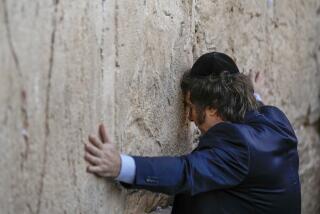Argentine Official Quits Amid Outcry Over Neo-Nazi Past
- Share via
BUENOS AIRES — Argentina’s minister of justice left his post Thursday after three weeks of controversy over revelations that he belonged to a neo-Nazi organization as a young man.
Rodolfo Barra, 48, attended his final Cabinet meeting Thursday morning and said he was resigning to end the criticism of the government of President Carlos Menem.
“In politics, when you can save your government problems, I believe you have to do it,” Barra told a Buenos Aires radio station.
A self-proclaimed Catholic conservative, Barra had endured increasing complaints from the media and the Jewish community about his dubious past in a society where the wounds of anti-Semitism remain fresh.
Barra admitted belonging as a teenager to Tacuara, a neo-Nazi organization that committed acts of anti-Semitic brutality in the 1960s. As a 27-year-old student, he allegedly participated in a violent purge of a national university led by an openly fascist rector. And a newspaper charged Sunday that Barra was arrested as a youth in the firebombing of a synagogue--a charge he reportedly denied.
This background made Barra especially unsuited to run the nation’s troubled justice system, critics said, citing traditions of dictatorship, anti-Semitism and neo-Nazism in Argentina. Barra was the titular head of the investigators probing the unsolved cases of two car-bomb attacks against Jewish targets in 1992 and 1994, which were allegedly the work of Middle Eastern terrorists and Argentine accomplices.
“We cannot permit ourselves the luxury of having such a minister because this is a nation that has been historically suspected of activity against Jews,” said Hector D’Amico, editor of Noticias, the magazine that ignited the scandal three weeks ago by documenting Barra’s membership in Tacuara. “He was a neo-Nazi during an era of terror in Argentina that all of us would prefer to forget.”
The second anniversary of the most recent terrorist bombing in Buenos Aires, a 1994 blast at a Jewish community center that was the deadliest such attack outside Israel since World War II, falls on July 18. Eighty-seven people were killed in the bombing.
Leaders of the nation’s 250,000-member Jewish community, one of the world’s largest, plan street marches protesting what they call ineptitude and corruption in the investigation. Some accuse right-wing elements in the security forces of involvement in the attacks or subsequent alleged cover-ups.
The revelations about Barra’s past featured dramatic and aging photos of glowering youths proffering the Nazi salute, but the outrage was not unanimous. While Noticias and Pagina 12, an investigative daily, dogged the minister with revelations and editorials, other publications and media outlets appeared to ignore the story. And some Jewish leaders were criticized for their seemingly passive attitude.
One explanation is that Argentines tend to avoid digging into their painful recent past. More than a few current public figures--including the recently appointed director of the state television channel--have alleged past links to extremist right-wing ideologies.
Menem may have jettisoned Barra to avoid criticism in the United States, where he is scheduled to travel this weekend to attend the Olympics, according to analysts such as Sergio Widder, local representative of the Los Angeles-based Simon Wiesenthal Center.
Widder, whose Nazi-hunting watchdog group led the campaign against the minister, called Barra’s resignation a surprising and positive development.
“This is not the triumph of a single group but the institutional triumph of the democracy,” Widder said. “It strengthens the democratic system when an official resigns because he has been so intensely questioned.”
Barra was replaced by his highest-ranking deputy, Elias Jassan, who is Jewish and hails from Menem’s home province of La Rioja.
More to Read
Sign up for Essential California
The most important California stories and recommendations in your inbox every morning.
You may occasionally receive promotional content from the Los Angeles Times.













